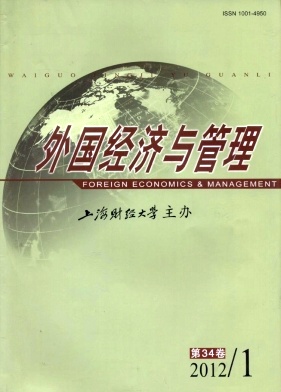新福特制管理思潮述评
外国经济与管理 2012 年 第 34 卷第 01 期, 页码:74 - 81
摘要
参考文献
摘要
20世纪晚期,西方发达国家为了适应知识经济条件下的组织管理需要,掀起了一股新福特制管理思潮,一些企业组织进行了新福特制管理尝试。本文对福特制的演变过程进行了讨论,分析了新福特制的理论基础,并对新福特制的核心内容进行了深入的探讨。
[1]Barker J R.A rhetorical critic of organization:An attitude to-ward organizations[J].Electronic Journal of Radical Organi-sation Theory,2004,8(1):1-8.
[2]Batt R and Doellgast V.Groups,teams and the division of la-bor:Interdisciplinary perspectives on the organization of work[J].Ackroyd S,et al(Eds.).The Oxford handbook of workand organization[C].Oxford:Oxford University Press,2005.
[3]Collinson D and Ackroyd S.Resistance,misbehaviour and dis-sent[A].Ackroyd S,et al(Eds.).The Oxford handbook ofwork and organization[C].Oxford:Oxford University Press,2005.
[4]Drucker P F.Management’s new paradigm[J].Forbes,1998,10(5):152-168.
[5]Drucker P F.They’re not employees,they’re people[J].Harvard Business Review,2002,80(1/2):70-77.
[6]Drucker P F.Managing oneself[J].Harvard Business Re-view,2005,83(1/2):100-109.
[7]Englyst L,et al.Commodity team motivation and performance[J].Journal of Purchasing and Supply Management,2008,14(1):15-27.
[8]Hodson R.Dignity in the workplace under participative man-agement:Alienation and freedom revisited[J].American Socio-logical Review,1996,61(5):719-738.
[9]Jaros S.Skill dynamics,global capitalism,and labour processtheories of work[J].Tamara Journal,2005,l5(5):5-16.
[10]Josserand E,et al.From bureaucratic to post-bureaucratic:The difficulties of transition[J].Journal of OrganizationalChange Management,2006,19(1):5-7.
[11]Maravelias C.Freedom at work in the age of post-bureau-cratic organization[J].Ephemera,2007,7(4):555-574.
[12]McKenna S,et al.Managing,managerial control and manag-erial identity in the post-bureaucratic world[J].Journal ofManagement Development,2010,29(2):128-136.
[13]Moor L and Littler J.Fourth worlds and neo-Fordism:Americanapparel and the cultural economy of consumer anxiety[J].Cultural Studies,2008,22(5):700-723.
[14]Pruijt H D.Teams between neo-Taylorism and anti-Taylo-rism[J].Economic and Industrial Democracy,2003,24(1):77-101.
[15]Sakolsky R.Disciplinary power and the labour process[A].Sturdy A,et al(Eds.).Skill and consent:Contemporarystudies in the labour process[C].London:Routledge,1992.
[16]Sewell G.Importance and measurement of minimum film-forming temperature[J].Pigment&Resin Technology,1998,27(3):173-174.
[17]Sewell G.Don Nick work?Rethinking managerial control inan era of knowledge work[J].Organization,2005,12(5):685-704.
[18]Spreitzer G M.Psychological empowerment in the workplace:Dimensions,measurement and validation[J].Academyof Management Journal,1995,38(5):1442-1465.
[19]Thompson P and Callaghan G.Edwards revisited:Technicalcontrol in call centres[J].Economic and Industrial Democra-cy,2001,22(1):13-37.
[20]Thompson P.The voice of the past:Oral history[M].(Third Ed.)Oxford:Oxford University Press,2003:139.
[2]Batt R and Doellgast V.Groups,teams and the division of la-bor:Interdisciplinary perspectives on the organization of work[J].Ackroyd S,et al(Eds.).The Oxford handbook of workand organization[C].Oxford:Oxford University Press,2005.
[3]Collinson D and Ackroyd S.Resistance,misbehaviour and dis-sent[A].Ackroyd S,et al(Eds.).The Oxford handbook ofwork and organization[C].Oxford:Oxford University Press,2005.
[4]Drucker P F.Management’s new paradigm[J].Forbes,1998,10(5):152-168.
[5]Drucker P F.They’re not employees,they’re people[J].Harvard Business Review,2002,80(1/2):70-77.
[6]Drucker P F.Managing oneself[J].Harvard Business Re-view,2005,83(1/2):100-109.
[7]Englyst L,et al.Commodity team motivation and performance[J].Journal of Purchasing and Supply Management,2008,14(1):15-27.
[8]Hodson R.Dignity in the workplace under participative man-agement:Alienation and freedom revisited[J].American Socio-logical Review,1996,61(5):719-738.
[9]Jaros S.Skill dynamics,global capitalism,and labour processtheories of work[J].Tamara Journal,2005,l5(5):5-16.
[10]Josserand E,et al.From bureaucratic to post-bureaucratic:The difficulties of transition[J].Journal of OrganizationalChange Management,2006,19(1):5-7.
[11]Maravelias C.Freedom at work in the age of post-bureau-cratic organization[J].Ephemera,2007,7(4):555-574.
[12]McKenna S,et al.Managing,managerial control and manag-erial identity in the post-bureaucratic world[J].Journal ofManagement Development,2010,29(2):128-136.
[13]Moor L and Littler J.Fourth worlds and neo-Fordism:Americanapparel and the cultural economy of consumer anxiety[J].Cultural Studies,2008,22(5):700-723.
[14]Pruijt H D.Teams between neo-Taylorism and anti-Taylo-rism[J].Economic and Industrial Democracy,2003,24(1):77-101.
[15]Sakolsky R.Disciplinary power and the labour process[A].Sturdy A,et al(Eds.).Skill and consent:Contemporarystudies in the labour process[C].London:Routledge,1992.
[16]Sewell G.Importance and measurement of minimum film-forming temperature[J].Pigment&Resin Technology,1998,27(3):173-174.
[17]Sewell G.Don Nick work?Rethinking managerial control inan era of knowledge work[J].Organization,2005,12(5):685-704.
[18]Spreitzer G M.Psychological empowerment in the workplace:Dimensions,measurement and validation[J].Academyof Management Journal,1995,38(5):1442-1465.
[19]Thompson P and Callaghan G.Edwards revisited:Technicalcontrol in call centres[J].Economic and Industrial Democra-cy,2001,22(1):13-37.
[20]Thompson P.The voice of the past:Oral history[M].(Third Ed.)Oxford:Oxford University Press,2003:139.
引用本文
罗珉, 郭英. 新福特制管理思潮述评[J]. 外国经济与管理, 2012, 34(1): 74–81.
导出参考文献,格式为:
上一篇:价值网研究渊源与聚变效应探析
下一篇:投稿须知(新版)





 5647
5647  593
593

